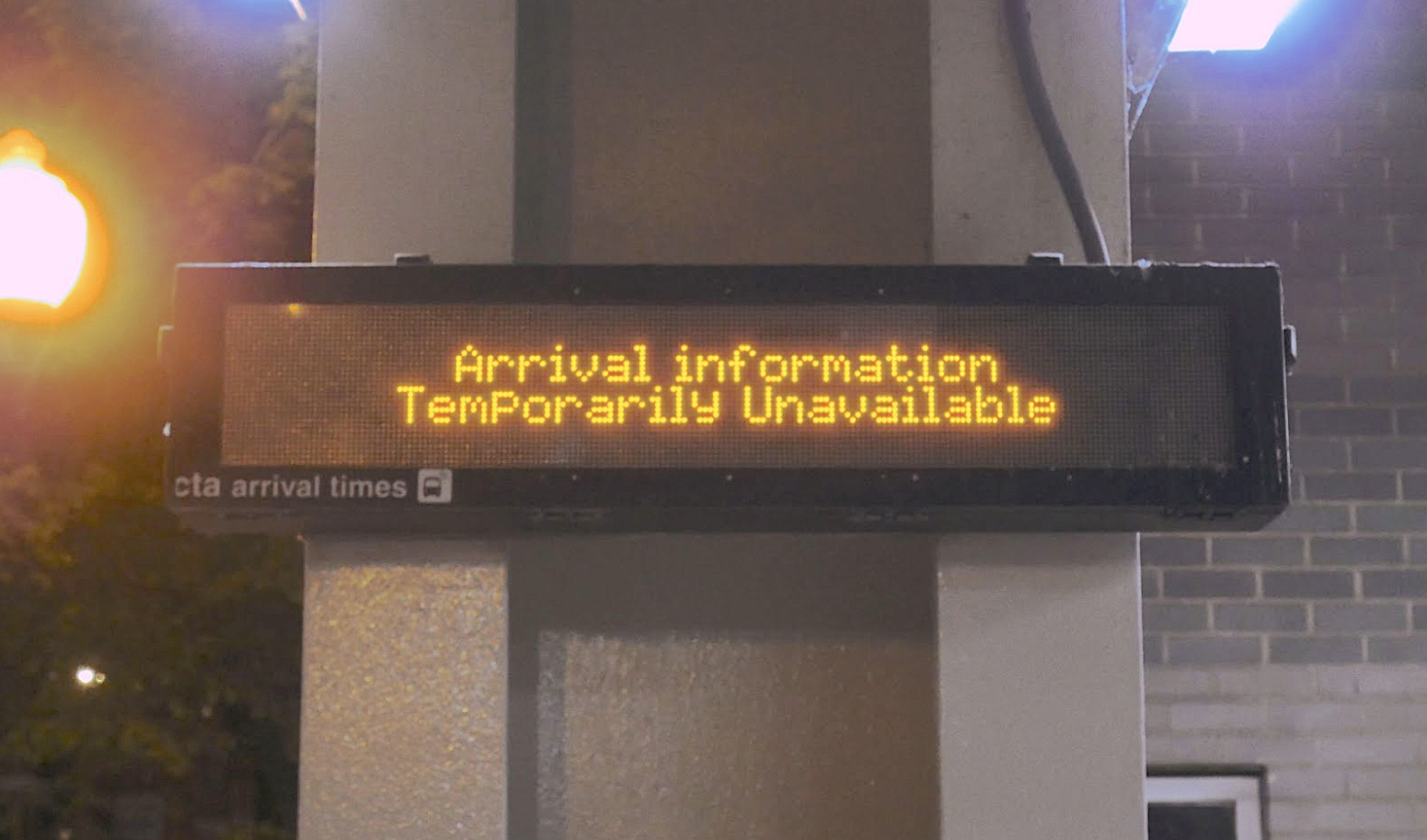
After more than a year of negotiations and debate, transit revenue and reform failed to pass the state legislature by the budget deadline on Saturday, May 31. There are still options to avert the transit fiscal cliff, though they require a higher threshold to pass. Local transit agencies must dedicate significant resources to preparing for difficult service cuts in the meantime.
HB3438 passed the state senate with funding and reform options after 11:30 pm on Saturday, following three new amendments added earlier that day. However, the state house of representatives failed to take a vote on the bill, and the threshold to pass any revenue or reform bill increased to a 60 percent majority requirement as the clock struck midnight.
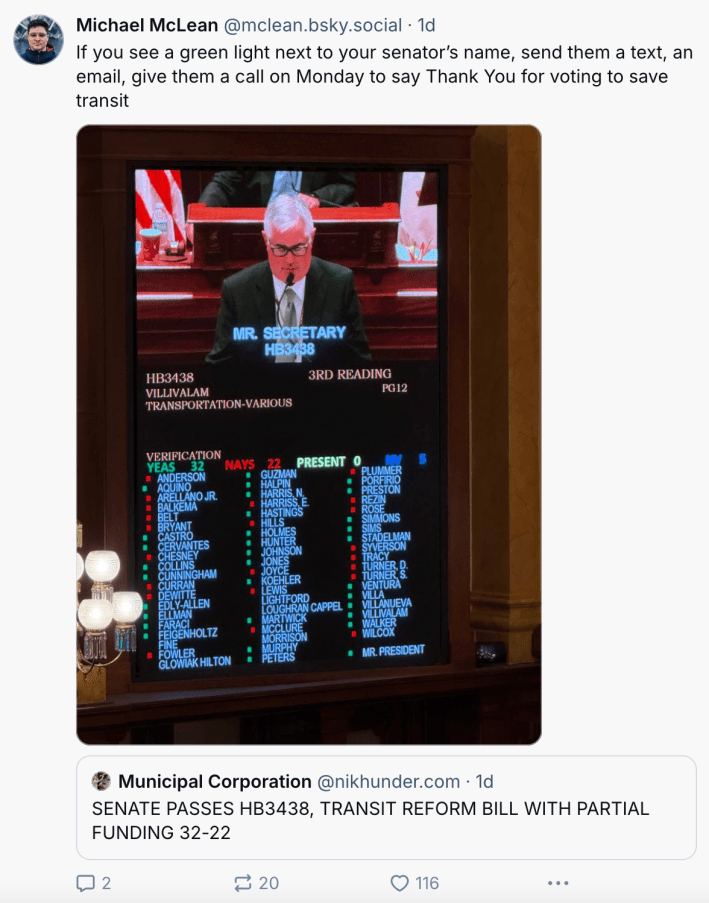
Governor Pritzker released an initial statement celebrating the passage of the overall state budget, stating “Illinois is on the right track.” Later in the day he addressed transit during a post-budget press conference:
"I think there’s significant work that will need to be done over the summer and in the fall to make sure that it gets across the board," the governor said, reiterating later, "The fact is that we need to address transit funding as fast as possible, and no doubt the legislators will be meeting over the course of the summer."
"Our legislators let dysfunction rule and failed to do their job to deliver for transit riders," wrote Kyle Lucas, executive director of Better Streets Chicago, adding, "It is troubling to hear Governor Pritzker seem to not understand the urgency of the moment and the devastating impacts that these service cuts would have. Our leaders bear the responsibility, but their constituents will bear the burden of the consequences."
"We just ran out of time," said Jack Darin, director of the Sierra Club's Illinois Chapter, who was in Springfield to support the initiative as a member of the Illinois Clean Jobs Coalition. "It’s obviously disappointing that we missed this opportunity to give Chicago and downstate Illinois better, more reliable transit, but we’re not done. We have seen a proposal that meets our needs. Hopefully the house will be enacting that at their earliest opportunity, we just don’t know when that will be."
Time for a comeback?
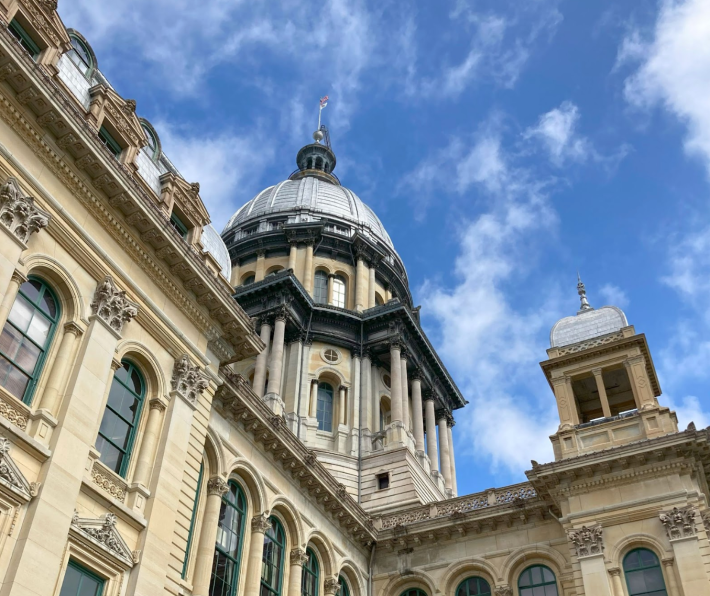
Transit could be addressed in the fall veto session, or the governor may opt to call a special summer legislative session. Capitol Fax reports that the fall veto session schedule has not been posted yet, an unusual delay. The Regional Transportation Authority and the service boards are due to start doomsday planning this Monday, however, as they prepare budgets including only known funding levels for FY26 in advance of October public hearings.
State democrats hold a supermajority of 78 seats in the House, but nine of those represent areas outside Chicagoland. Since 71 house votes will be needed to pass a bill with a 60 percent majority, passage is likely to require the approval of at least two downstate democrats. To win those votes, some proposed funding sources that don't have broad support may need to be replaced, which would then require a 60 percent majority passage in the state senate as well.
While only 32 state senators voted in favor of HB3438 on Saturday, a 60 percent majority for their next vote will require 36 senators. Of the 40 senate democrats, three voted against (Doris Turner of Springfield, Patrick Joyce of Kankakee, and Christopher Belt of Cahokia Heights) and five did not vote (Laura Fine of Glenview, Suzanne Glowiak Hilton of Western Springs, Kimberly Lightford of Chicago, Meg Loughran Cappel of Shorewood, and Julie Morrison of Deerfield). If HB3438 does not pass the house, senate democrats will need to rely on the members who missed Saturday’s vote.
"It’s time to call your state senator, if they voted yes, to thank them," said Darin, adding, "Calling your state representative about HB3438 and urging their support is really critical right now."
"We need to make our voices as constituents loud and clear," Lucas said. "Call your legislators. Let them know they have failed you." Lucas asked that transit advocates use the savetransit.org website to learn how to "get in the fight with us – we need people to be ready to mobilize."
What happened to the funding?
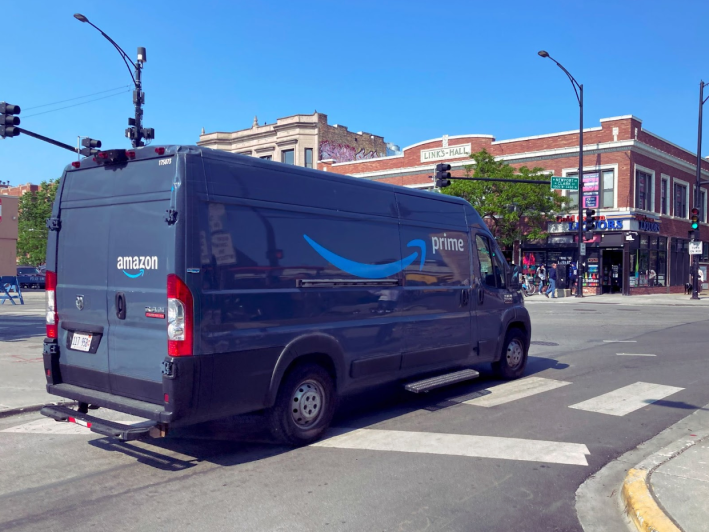
When HB3438 surfaced earlier this week, revenue sources included:
- 10 percent surcharge on ride-hail (Uber, Lyft etc.) trips in Chicagoland
- $1/day tollway fee
- Real Estate Transfer Tax expanded to include the entire six-county region
- $0.06/kWh electric vehicle charging fee from charging providers
To try to quash the ride-hail and delivery fees, Uber released a push notification to many app users calling the legislation a "secret tax hike". This was in stark contrast to its notification to overcharged customers earlier this month that hid the reason for a new credit in their accounts. Ultimately, the ride hail surcharge stayed in the senate-passed bill.
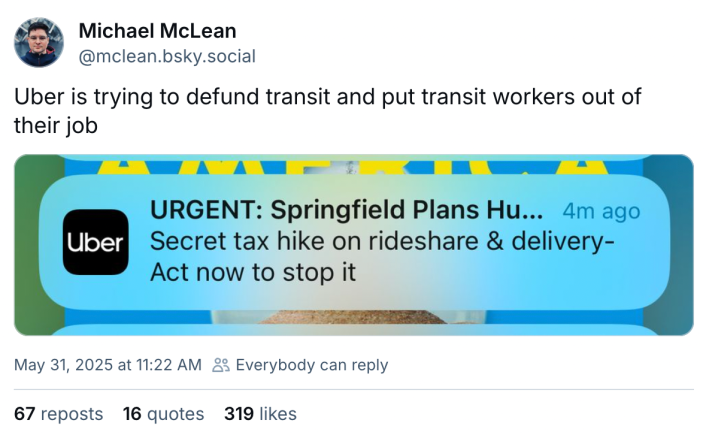
Also originally included was a prohibition on using the RTA sales tax for non-transit uses. Collar counties use this funding for county roads and law enforcement officers, and lobbied against this proposal, specifically arguing it could not be replaced without an alternative revenue source. This change was removed from the bill on Saturday morning, and was not included in the senate-passed bill.
The tollway fee, dedicated to financing new mixed-use development around transit hubs rather than operations, received pushback from labor unions. "This proposal is inequitable, as suburban drivers would effectively subsidize urban transit systems such as the CTA, in addition to tolls they already pay," argued Marc Poulos of the construction and service industry union International Union of Operating Engineers Local 150 argued in testimony to the legislature earlier in the week. This revenue source was also removed from the senate-passed bill.
Lawmakers pivoted to a new revenue source from a delivery fee on Saturday. A $1.50 "Retail Delivery Climate Impact Fee" was included in the bill passed by the senate, covering deliveries of restaurant food and general goods. Deliveries of groceries and medication would have been exempt, as would deliveries made by bicycles and other non-motorized means. The fee would have been applied statewide, with funds going to support the newly-created Northern Illinois Transit Authority (a more powerful replacement for the RTA) in Chicagoland as well as downstate transit services. Illinois would be the third state to implement such a fee, following Colorado in 2021 and Minnesota in 2023.
Rural legislators expressed strong opposition to this source, pointing out that it would be collected in areas far from any transit service and labeling it a regressive tax. Opponents cited Pritzker’s warning that he would veto any 'broad-based taxes'. The governor later clarified in his press conference that the delivery tax was not in this category. "When I think of the broad-based tax in the state, I think of the largest sources of tax revenue," he said. "And those are the individual income tax, the corporate income tax, the sales tax."
Doomsday countdown
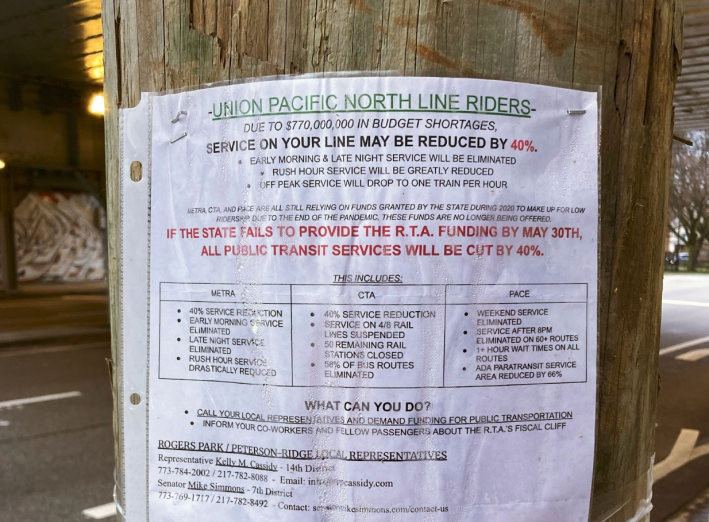
Without passing any new legislation, the status quo remains: the RTA, the 50 percent farebox recovery ratio, and a $771 million budget gap.
"The deadline was May 31, and now we're in uncharted territory," Lucas said. "The longer the Illinois General Assembly waits, the closer we are to cuts being finalized and implemented."
The RTA returns to work today knowing that this doomsday scenario requires them to determine how to increase system-generated revenue and decrease operating costs to balance its 2026 budget. "In the coming weeks the RTA will work with the Service Boards on a regional budget that by law must only include funding we are confident the system will receive in 2026, RTA spokesperson Tina Fassett Smith said in a statement released Sunday.

For the rest of the year, there will not be an immediate change in service. Hiring and expansions of service will likely slow down, as the agencies’ administrations begin preparing for layoffs instead. The CTA will next updates its schedules in October. This will include "pick," the process of rail and bus operators choosing their upcoming assignments. While we could see small adjustments now to prolong the worst of the cuts next year, the CTA could be too far into the scheduling process to make major changes during that cycle.
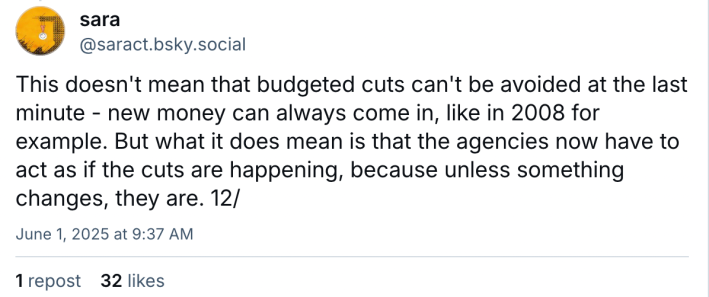
If the legislature does manage to pass a revenue increase after the service boards' fall budgeting, that future funding can be incorporated into 2026 budgets to avert cuts and layoffs. But the service boards cannot expect this funding before it's actually approved, leaving them unable to plan for the efficient use of resources.
In order to avert the doomsday scenario, a solution in a summer session is preferable to one in the fall veto session.
Read the second half of this series, "The cutting edge: Transit agencies begin planning 40% service reductions"

Did you appreciate this post? Streetsblog Chicago is currently fundraising to help cover our 2025-26 budget. If you appreciate our reporting and advocacy on local sustainable transportation issues, please consider making a tax-deductible donation here. Thank you!
